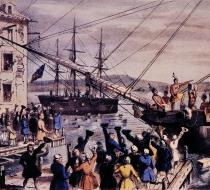Dumping Tea into the Sea - the Boston Tea Party 1 Favorite
Forget Sarah Palin. And take a history class and learn from the daring early settlers!
The Boston Tea Party was a political protest by the Sons of Liberty in Boston, a city in the British colony of Massachusetts, against the tax policy of the British government and the East India Company that controlled all the tea imported into the colonies. On December 16, 1773, after officials in Boston refused to return three shiploads of taxed tea to Britain, a group of colonists boarded the ships and destroyed the tea by throwing it into Boston Harbor. The incident remains an iconic event of American history, and other political protests often refer to it.
This action, part of a wave of resistance throughout the colonies, had its origin in Parliament's effort to rescue the financially weakened East India Company so as to continue benefiting from the company's valuable position in India. The Tea Act (May 10, 1773) adjusted import duties in such a way that the company could undersell even smugglers in the colonies. The company selected consignees in Boston, New York, Charleston, and Philadelphia, and 500,000 pounds of tea were shipped across the Atlantic in September.
In this historical event, direct action was deployed, people were united because of indignation and constant oppression.
quotes:
"Patriotism is as much a virtue as justice, and is as necessary for the support of societies as natural affection is for the support of families." by Benjamin Rush
"The inhabitants of that unfortunate city, who but a few months ago were in ease and affluence, have now, no other alternative than to stay and starve, or turn and beg. Endangered by the fire of their friends if they continue within the city, and plundered by the soldiery if they leave it. In their present condition they are prisoners without the hope of redemption, and in general attack for their relief, they would be exposed to the fury of both armies." Thomas Paine.







